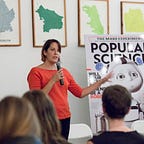F*#k Your Lightbulbs, We Need Systemic Change
Every Earth Day, my inbox and my news feed fill up with dozens of ways individuals can save the planet: drive less, eat less (or no) meat, stop flying, recycle more, buy less, and so on. That’s fine. But it’s not going to make the substantial dent in emissions needed to save Earth dwellers from catastrophe. And worse than that, this sort of thinking, the emphasis on individual action, often keeps us from the larger systemic changes that could actually move the needle.
That’s why this is also the favorite framework of the fossil fuel industry: hey, we’re not the problem, it’s you consumers and your endless desire for energy and growth and progress and stuff. As though they are not increasing production far faster than demand is increasing. As though they are not sitting smugly atop an economic system that pushes for growth at all costs, profits above all else, a system that encourages everyone to work more so they can buy more.
The thing is, unless you are an oil exec or you run a coal company or you’re a lobbyist who’s been pushing fossil fuel-friendly policies for years or a scientist paid to cast doubt on climate models your personal choices have very little to do with where we are as a planet, a country, and a species. The neat trick of individual choices narrative is that it takes Americans’ favorite thing—individualism—and weaponizes it, sending people spinning in circles of guilt over their burgers and long-haul flights, blissfully ignorant of the fact that their choices have been constrained by a powerful few.
The good news is that once the spell of individualism is broken, the path forward becomes more clear.
Earlier this year I spent a few months traveling up and down the West Coast interviewing crab fishermen who had just come together and decided to sue the fossil fuel industry. Theirs is the first industry to do so.
“At first I had the same reaction as a lot of fishermen,” Ben Platt told me. “Well I have a diesel engine on my boat, so why would I want to sue an oil company?”
In fact that is the oil companies’ stance too. Chevron spokesperson Sean Comey wrote to me about the case: “It’s always regrettable to be in a legal dispute with a customer, especially considering how much diesel the fishing fleets purchase.”
But the fishermen have evolved in their thinking. Having studied various documents and studies revealing what the industry knew and when, having read about how they were using climate science to benefit themselves while telling everyone else to ignore it, they are less inclined to take on the blame as consumers of fossil fuels.
“You know what I think it boils down to for me is that I’ve done everything I could do as a fossil fuel burning boat operator to minimize my carbon footprint,” Platt says. He has, in fact, done more than many. He cut his crab season in half six years ago to re-power his boat to the most fuel-efficient engine out there. “It’s all computer electronically controlled, and I didn’t even want to do that because when you’re a commercial fisherman out on the high seas, computer electronic controls scare you because if something goes wrong we can’t fix it.”
“A lot of us have done this, we’ve modernized our equipment at a lot of our own expense and time because we’re trying to have as little of a carbon footprint as possible,” he continues. “But there’s only so much we can do. We’re not the fossil fuel companies, we’re not the big energy companies …. we’re just using what’s available.”
And therein lies the rub. We’re all just using what’s available. And in leaning on the personal responsibility side of American individualism, the fossil fuel industry has convinced a large percentage of the population that the only action they can take as individuals is to buy different stuff, to live slightly differently. Somewhere along the way, we forgot we could demand systemic change; that these systems created by humans could also be changed by them, or even dismantled altogether.
Learn more about the West Coast crabbers and their suit in Season 2 of Drilled, out now:
